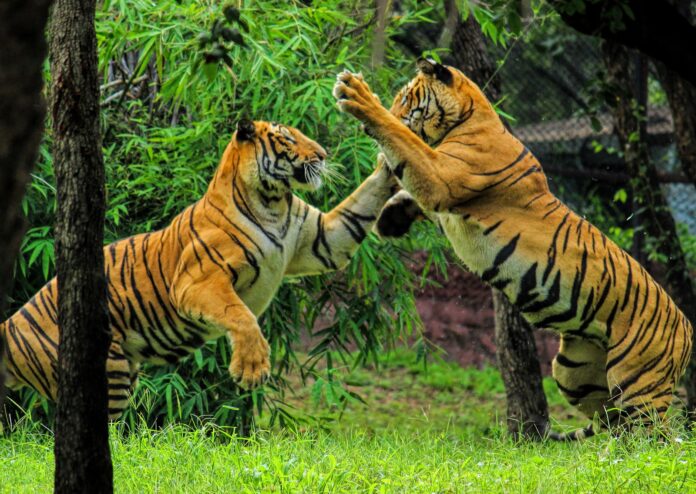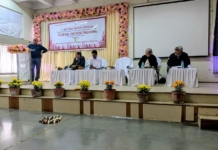World Lion Day: Let’s pledge to protect the King of the Jungle-Puri
Jaswant Singh Puri/ August 10,2024
World Lion Day, observed on August 10th was created by Big Cat Rescue, a non-profit organization based in Tampa, Florida, dedicated to the rescue and rehabilitation of abused and abandoned big cats by focusing on raising awareness about lions and their conservation. The day was first observed in 2013, aligning with the broader goals of Big Cat Rescue to promote public education and awareness regarding the conservation challenges facing big cats worldwide. This day also offers a valuable opportunity to highlight other endangered big cats such as Bengal tigers and snow leopards. Understanding the status, habitat, and threats faced by these magnificent creatures can help bolster efforts for their protection.
Conservation Efforts and Challenges
Bengal Tigers
Conservation efforts for Bengal tigers include the establishment of tiger reserves, anti-poaching measures, and community-based programs to mitigate human-wildlife conflict. India’s Project Tiger, launched in 1973, has been instrumental in stabilizing and increasing the tiger population in protected areas.
Key Features:
- Reserves: Establishment of dedicated tiger reserves across India, where habitats are protected and managed.
- Conservation Efforts: Includes anti-poaching measures, habitat restoration, and monitoring of tiger populations.
- Awareness Campaigns: Educational programs and campaigns to raise awareness about tiger conservation.
- Research and Monitoring: Regular surveys and research to track tiger populations and their health.
Snow Leopards

The conservation of snow leopards involves habitat preservation, anti-poaching initiatives, and community engagement programs like livestock insurance schemes to reduce retaliatory killings. Organizations such as the Snow Leopard Trust work with local communities to promote sustainable practices and protect snow leopard habitats.
Key Features of Livestock Insurance Schemes:
- Premium Payments: Farmers and herders pay a small premium to enroll in the insurance program.
- Compensation: In the event of livestock loss due to predation, the program provides financial compensation to the affected individual.
- Verification Process: A verification process ensures that the livestock loss was indeed caused by predation and not by other factors such as disease or theft.
- Community Involvement: Local communities are often involved in managing the schemes, which helps build trust and ensures transparency.
Cheetah

Project Cheetah is an ambitious wildlife conservation initiative aimed at reintroducing the cheetah, the world’s fastest land animal, into the wilds of India. This project marks a historic moment as it seeks to re-establish a species that was declared extinct in the country in 1952. Project Cheetah faces several challenges, including ensuring the genetic diversity of the reintroduced population, managing human-wildlife conflicts, and securing long-term funding and support. However, the project’s success could have far-reaching implications for wildlife conservation in India.
Key Features:
- Reintroduction: The project involves the translocation of cheetahs from Africa to India’s designated habitats, specifically Kuno National Park in Madhya Pradesh.
- Habitat Preparation: Extensive work is done to prepare and secure habitats to support the cheetahs’ needs, including prey availability and landscape suitability.
- Monitoring and Research: Continuous monitoring of the cheetahs’ adaptation to their new environment, health assessments, and research on their behavior and survival.
- Community Engagement: Working with local communities to reduce human-wildlife conflict and increase support for the project.
Achievements of Projects related to Big Cats
- Significant increase in tiger numbers in certain reserves.
- Greater focus on holistic conservation, including prey species and habitat.
- Risk Mitigation: Helps to reduce the economic impact on farmers who suffer losses from wildlife predation, thereby lessening the financial burden and encouraging coexistence.
- Improved Livelihoods: By providing compensation, these schemes can improve livelihoods and reduce poverty, which can also help in reducing retaliatory killings of wildlife.
- Incentive for Conservation: Reduces the incentive for farmers to harm wildlife in retaliation for livestock losses, supporting broader conservation efforts.
- Successfully reintroduced cheetahs to India, marking the return of a species that had been extinct in the wild in the country for decades.


Conclusion
World Lion Day is a crucial reminder of the ongoing challenges faced by lions and the importance of global conservation efforts. By raising awareness, promoting education, and encouraging action, we can work together to ensure that lions continue to roam the wild landscapes they have long called home.

Note: The views expressed are personal. This article is dedicated to Alka Puri, wife of Dr. Ajit Singh Puri and mother of Jaswant Singh Puri.













